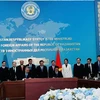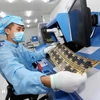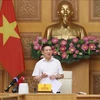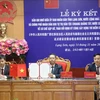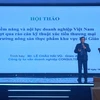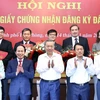Faced with plunging foreign direct investment (FDI) in agriculture, the Ministry of Agriculture and Rural Development is considering new methods to attract foreign investors to pump prime the sector with new capital sources, the Vietnam Investment Review reported on May 27.
Despite robust exports of agricultural products worth 28.5 billion USD last year, there had been an alarming plunge in FDI inflows into the sector, said Minister of Agriculture and Rural Development Cao Duc Phat at a recent workshop in Hanoi.
Fifteen years ago, FDI into agriculture, forestry and fisheries accounted for 15 percent of Vietnam’s total FDI volumes, but the rate had plummeted to 0.5 percent over the past three years.
Nguyen Ba Cuong, Deputy Director of the Ministry of Planning and Investment’s (MPI) Foreign Investment Agency, said by the end of April this year, Vietnam’s agriculture, forestry and fisheries would attract 520 foreign-invested projects of the country’s total number of 16,300.
“Almost all the FDI projects in agriculture are in the Red River and Mekong Delta regions. Remote provinces have barely attracted any FDI projects in this field. FDI projects in agriculture, forestry and fisheries mainly focus on areas with quick capital returns such as farm produce, timber and food processing, animal husbandry and animal feed,” said Cuong.
Nguyen Van Toan, Vice Chairman of the Vietnam Association of Foreign-invested Enterprises put the blame on sudden changes in planning and policies of local authorities that had contributed to the sharp decreases in FDI in agriculture.
M eanwhile, Bui Tat Thang, Director of the MPI’s Development Strategy Institute said the lack of a long-term FDI attraction strategy and weak rural infrastructure still constituted major barriers for FDI inflows into Vietnam’s agriculture sector.
Determined to address the issue, Minister Phat said, “We realise that a review of the mechanisms and policies is required to stimulate foreign investors into the agricultural sector as we know it would bring about benefits for both businesses and farmers.”
The minister also promised to create a favourable agricultural investment environment, shorten administrative procedures, cut costs and remove the inconsistencies between policies and implementation.
According to Phat, in order to encourage foreign investors in agriculture, the Ministry of Agriculture and Rural Development (MARD) was considering allowing foreign businesses to directly procure farm produce from farmers instead of through intermediaries.
According to the MARD, it needed to create large-scale domestic businesses capable of partnering with foreign firms, while at the same time improving the quality of human resources in the sector.-VNA
Despite robust exports of agricultural products worth 28.5 billion USD last year, there had been an alarming plunge in FDI inflows into the sector, said Minister of Agriculture and Rural Development Cao Duc Phat at a recent workshop in Hanoi.
Fifteen years ago, FDI into agriculture, forestry and fisheries accounted for 15 percent of Vietnam’s total FDI volumes, but the rate had plummeted to 0.5 percent over the past three years.
Nguyen Ba Cuong, Deputy Director of the Ministry of Planning and Investment’s (MPI) Foreign Investment Agency, said by the end of April this year, Vietnam’s agriculture, forestry and fisheries would attract 520 foreign-invested projects of the country’s total number of 16,300.
“Almost all the FDI projects in agriculture are in the Red River and Mekong Delta regions. Remote provinces have barely attracted any FDI projects in this field. FDI projects in agriculture, forestry and fisheries mainly focus on areas with quick capital returns such as farm produce, timber and food processing, animal husbandry and animal feed,” said Cuong.
Nguyen Van Toan, Vice Chairman of the Vietnam Association of Foreign-invested Enterprises put the blame on sudden changes in planning and policies of local authorities that had contributed to the sharp decreases in FDI in agriculture.
M eanwhile, Bui Tat Thang, Director of the MPI’s Development Strategy Institute said the lack of a long-term FDI attraction strategy and weak rural infrastructure still constituted major barriers for FDI inflows into Vietnam’s agriculture sector.
Determined to address the issue, Minister Phat said, “We realise that a review of the mechanisms and policies is required to stimulate foreign investors into the agricultural sector as we know it would bring about benefits for both businesses and farmers.”
The minister also promised to create a favourable agricultural investment environment, shorten administrative procedures, cut costs and remove the inconsistencies between policies and implementation.
According to Phat, in order to encourage foreign investors in agriculture, the Ministry of Agriculture and Rural Development (MARD) was considering allowing foreign businesses to directly procure farm produce from farmers instead of through intermediaries.
According to the MARD, it needed to create large-scale domestic businesses capable of partnering with foreign firms, while at the same time improving the quality of human resources in the sector.-VNA
